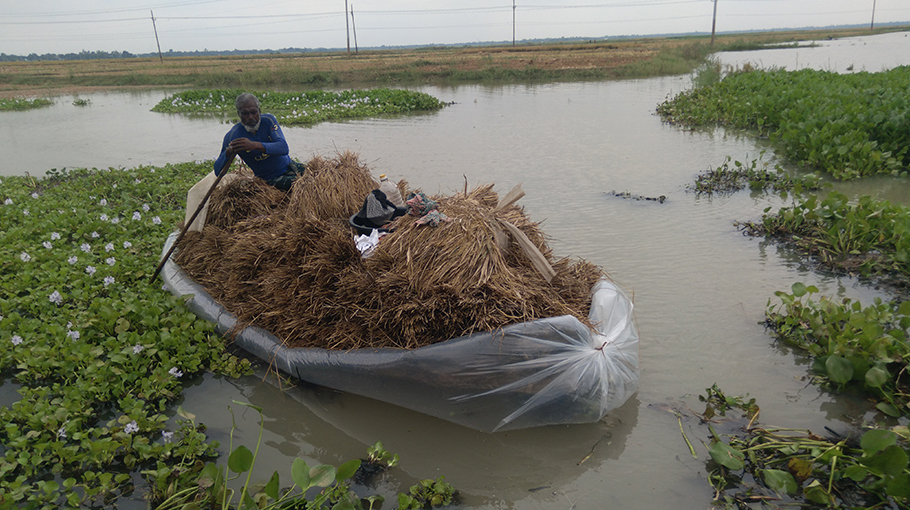Bumper yield of Boro paddy despite flood in Pabna
Lack of transportation makes it hard to carry out harvested paddy

The farmers of Chatmohar are harvesting Boro paddy and taking it home amidst labor crisis, unfavorable environment,. However, uncertainty over distribution of paddy has been raised among farmers due to the early floods. Due to high cost of production and processing, farmers are not getting much benefit even though the price of paddy is good. Most of the paddy in the low lying areas has already been harvested. Due to the increase in water for the last three days, the farmers are not worried about whether they will be able to cut the paddy and take it home. Meanwhile, due to the labor crisis, the farmers are not able to harvest the ripe paddy in the field due to lack of labor. Although farmers in the highlands transport paddy in different vehicles, many farmers in the lowlands are transporting paddy in special boats made of polythene.
According to the Chatmohar Upazila Agriculture Office, the target for Boro paddy cultivation has been set at 9,200 hectares of land in 11 unions of Chatmohar during the current Boro cultivation season. Achieved 9 thousand 610 hectares. In this area, usually BRRI-28, 29, 50, 57, 64, 81, 84, 89, 92, 98 varieties of paddy are cultivated. In addition, hybrid SL6H, Tej Gold, Doyle, Tia and Brack varieties of Boro paddy are cultivated.
Boro farmer Nazim Uddin of Katenga village of the upazila said he has been cultivating Boro paddy for a long time. Boro paddy cultivation usually cost him around 11 thousand Tk. If the paddy is good, the yield is 20 to 25 mounds.
However, those who cultivate other people's land on lease cost an additional Tk 6,000 in compensation. The owner of the irrigation system has to pay one fourth of the paddy produced. All in all, there is not much profit.
Boro farmer Abdul Gafur of Boailmari village said rainwater had already entered the Beel. It rained a few days ago. It is still raining often. I can't cut the paddy from the land and take it home by head or by car. Boat crisis has increased the problem even more.
So we have to make a boat with polythene in a special process and bring the paddy from the land to the paved road and take it home in another vehicle. If the water level continues to rise, there is a danger that many lands will be flooded.
Boro paddy farmer Abdur Razzak of Natabaria village said that despite the good price of paddy, there is no profit due to high cost of cultivation. There is also a problem in transporting paddy due to water entering the bill. Due to the boat crisis, we are carrying paddy by making boat-shaped vehicles with polythene as an alternative method. Although there are risks, the cost is low. He also said that it costs 700 to 1000 Tk to build a boat with polythene. Boro farmer Yar Mahmud of Hasupur village in the upazila said a worker has to pay Tk 800 per day. Even after that, the right kind of workers are not available.
Ignoring the decision of the Upazila Irrigation Committee, the owners of irrigation equipment are taking one-fourth of the paddy for irrigation in most of the areas.
In some areas, owners of irrigation equipment are taking one-fifth of paddy. There are ongoing disputes between farmers and owners of irrigation equipment.
Chatmohar Upazila Agriculture Officer AA Masum Billah said the current season's paddy harvesting has already started. More Boro cultivation has been done in 410 hectares of land than the target.
The average yield per hectare is 7.5 to 8.4 tons. Farmers are being asked to cut 60 percent of the paddy when it is ripe. Farmers are benefiting by cultivating Boro paddy at present as the price of paddy is good.




